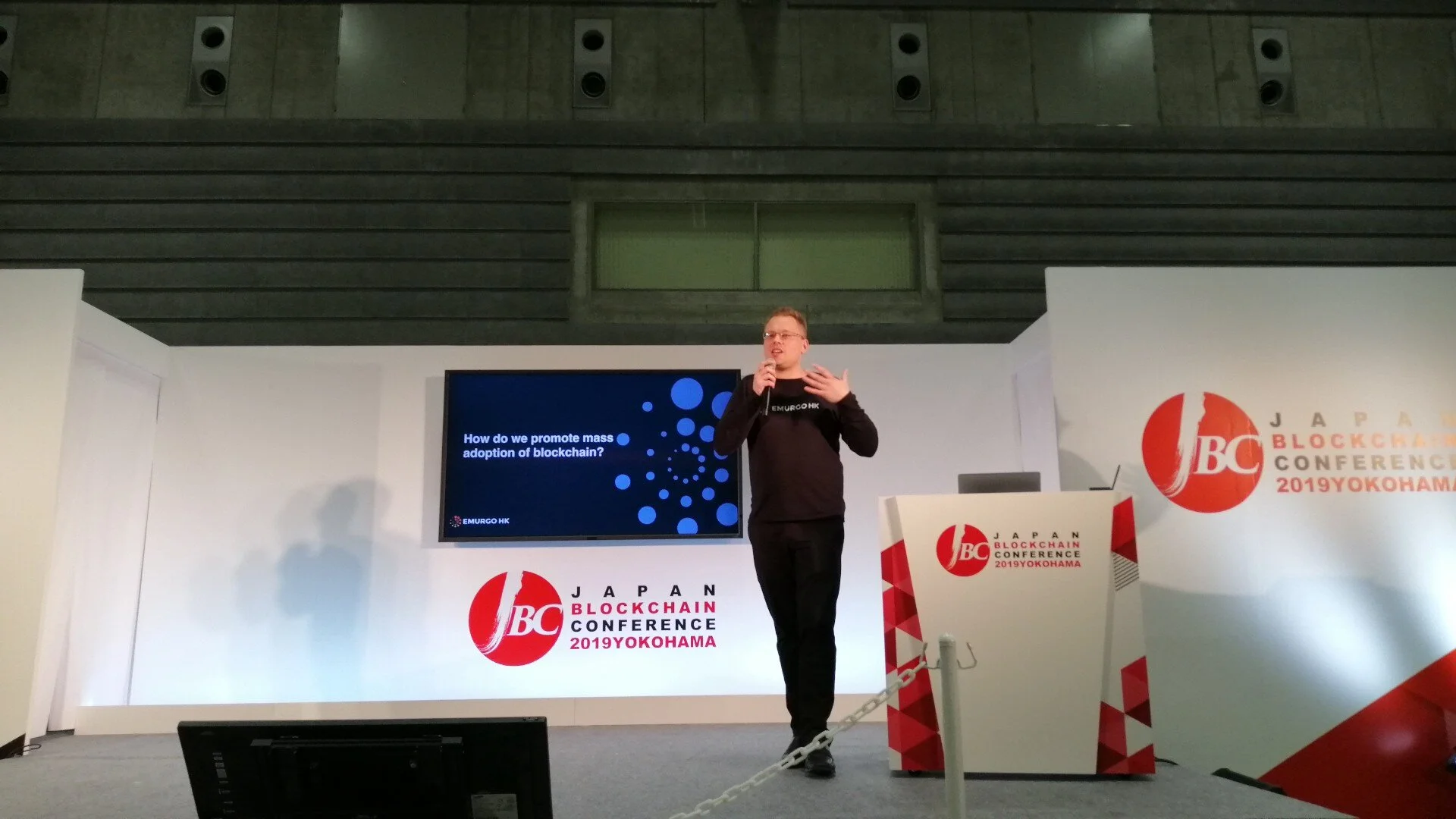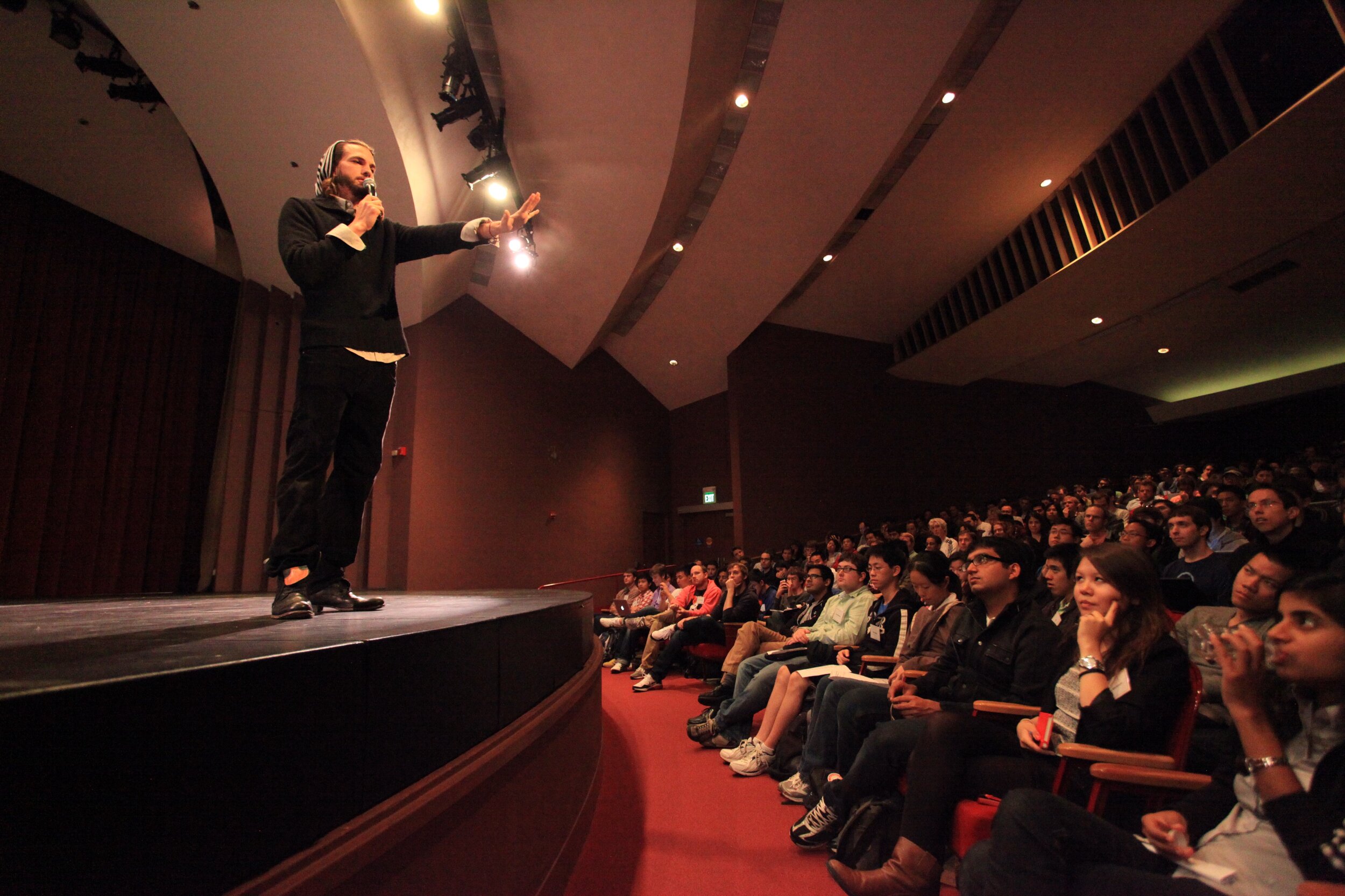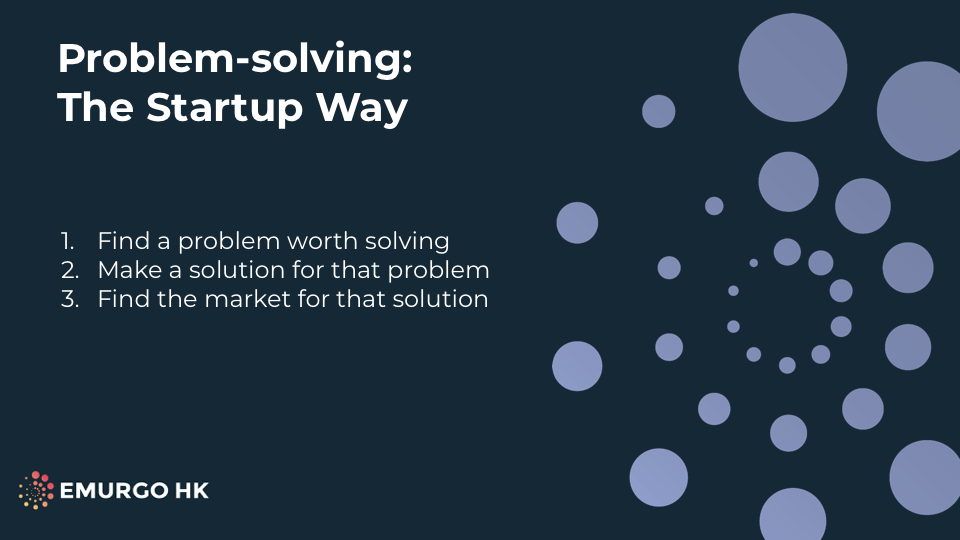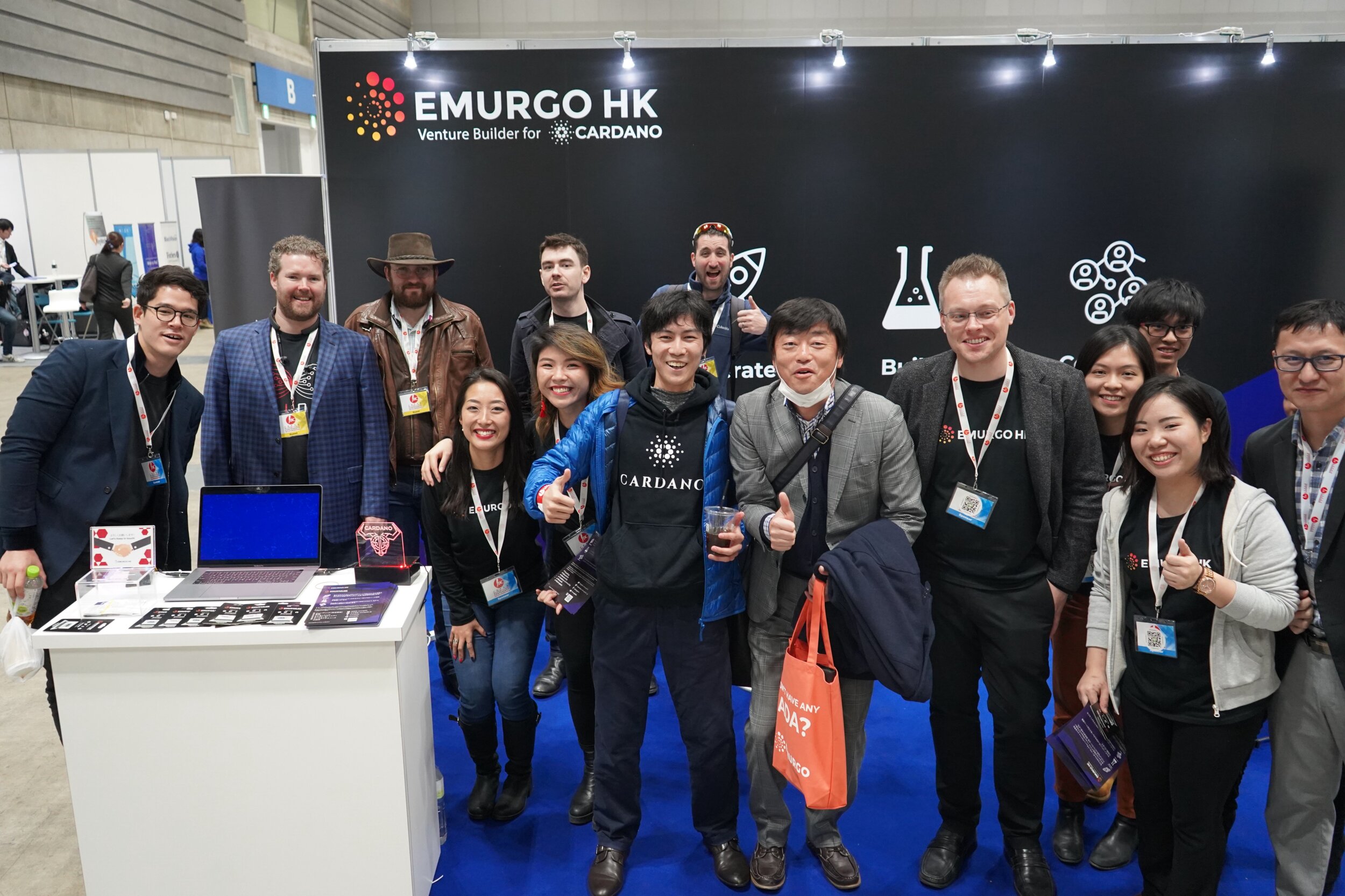Why EmurgoHK is Building a Startup Accelerator for Cardano
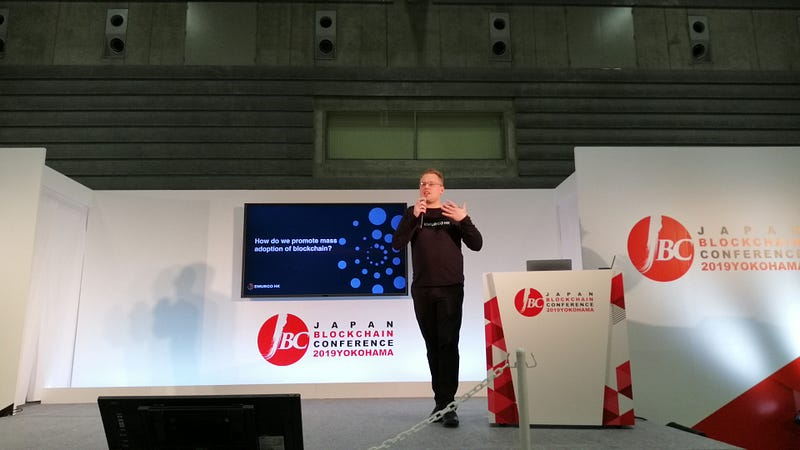
[This blogpost is an edited version of the talk that I presented at the Japan Blockchain Conference on 30 January, 2019]
EmurgoHK is the venture builder for the Cardano blockchain protocol. This means that our mission is the commercial adoption of Cardano worldwide. Everyone, not only entities within the Cardano project, but also other protocols and many outside companies, all have different approaches to that issue; the issue of how we promote commercial adoption of blockchain technology.
In other words, how do we get normal people, like the guy on the street, working with and using blockchain in his or her everyday life?
We all know that blockchain, cryptocurrency, and other related technologies, are still nowhere near widespread adoption or usage. That’s just a fact. My job, and the job of my team, is to change that. I think most of us can agree that to change that, we have to create solid use cases. Products and services that big companies can use, but also that regular people can use. And so what we’re doing in Hong Kong to bring that about is building a startup accelerator.
“‘Blockchain, cryptocurrency, and other related technologies, are still nowhere near widespread adoption or usage. That’s just a fact.’”
What is a startup accelerator?
Definitions range widely depending on who you talk to, but I like to call an accelerator a form of college. It’s not a normal college, but rather one where small, early-stage companies can go, and learn how to become mature and developed companies with well-known products.
The main part of an accelerator is a short, intensive, program lasting approximately three months. It’s for these early-stage startups that I mentioned above, and these companies are usually just two guys who have an idea. In some cases, they may also have an early prototype for a product. During the three-month program, we provide them with all the things that they need in order to grow.
Ashton Kutcher speaking to Y Combinator, considered by many to be the original startup accelerator
What are the things that an early-stage company needs in order to grow?
At the beginning, they need money. It’s hard to build a company without any money. So we provide a small amount of funding to them. In return, we get some equity in their company, which also keeps us committed to growing them in the long-term. We also provide them with a space to work, training on how to grow, and outside experts who come in and help them to develop their ideas. Additionally, we also provide benefits to them that actually come from outside companies. For example, through us, an outside company might give them free cloud storage, data analytics software, or some other service. By giving these services for free, we can help these early-stage startups to keep their costs low.
Why do we want to build a startup accelerator?
Since we are part of the Cardano family, we insist not only that the startups are building their products on blockchain, but specifically that they are building on the Cardano protocol. This approach is beneficial to us. Firstly, it means that more people are building on Cardano — we are literally growing the number of products. Secondly, it allows us to show the world just how fantastic this protocol is, and the wide range of products and services that you can build on it.
These are the reasons why EmurgoHK believes in the power of startup accelerators. But I personally do it because I love startups and I love accelerators.
One of the big things that I love about startups is that entrepreneurs build startups to solve problems. They do not establish startups because they want to build large companies, or giant conglomerates.
They want to solve problems.
Problem-solution-market fit, the startup way
What is the problem-solution-market fit?
It’s not quite as simple as ‘just’ solving problems. It’s actually a process, A process that has three clear and identifiable steps:
They have to have a problem that is worth solving.
They have to find the best solution for that problem.
They have to make sure that that solution fits into the market.
When I talk about ‘a problem that is worth solving’, what I mean is that the fact that something is a problem is not by itself enough. There are lots of problems out there; problems with the economy, with society, perhaps something wrong in one’s personal or business life. But the entrepreneur must ask: are other people also having this problem, or is it just me? Is it really a big problem? Will anyone else in the world care about solving this?
I don’t intend to be mean or negative. It’s just a fact that some problems are not worth solving.
I work as a mentor and an advisor at several startup accelerators in Asia, and so I run into problems that people are trying to solve ALL the time. On one occasion, I was approached by a young entrepreneur from Shanghai, where it gets quite hot and humid in the summer. He said that during the summers, people sometimes sit down to have a cold drink and find that they have run out of ice cubes. There is no ice in the house, which is a big problem, he told me.
Shanghai: hot, but how hot?
I agreed (and still do) that this is a problem. But it’s probably not one worth solving, and I don’t believe that the number of people having the same problem and who are actively looking for a solution is very big.
“‘Entrepreneurs…do not establish startups because they want to build large companies, or giant conglomerates. They want to solve problems.’”
Moving on to the second step — if an entrepreneur has identified a problem worth solving, he now has to find the best solution. This seems simple, but it’s important to remember that what we mean by ‘best solution’ is usually the quickest, simplest, and cheapest one. A solution should not be very difficult to build, or hard to understand, or very expensive to buy.
If I return to the ‘ice cube man’ in Shanghai, he told me that he thought he could build a fleet of cars, similar to Uber, that would drive around the city with coolers in the trunk. These coolers would be full of ice, and any user would use their smartphone to call for one of these vehicles to come and bring ice. He told me very proudly, ‘I can deliver ice anywhere in Shanghai in thirty minutes.’
Now once again, I agree that this IS a solution to the problem. But it is not quick, it’s not simple, and it’s not cheap. An easier solution would be to put all the users names on a list, and send them a text message once a week to remind them to buy ice. Quicker, simpler, cheaper.
Finally, the entrepreneur has to ask if this solution is marketable. In more direct terms: will people pay for this? This does not necessarily have to be a money payment. Many apps provide services for free, but you pay by giving away your personal data. The app then makes money by using or selling that data somehow. But there is always a price to pay for a solution. The question that the startup entrepreneur has to answer is: can I get people to pay this price? Whatever that price is.
This is the process. The problem-solution-market process. Nothing that I’ve said up to this point is particularly controversial, nor groundbreaking. But I mention it because I don’t think that this process is being used in blockchain right now.
Why isn’t problem-solution-market working in blockchain?
Blockchain is a really useful and powerful tool, but if you’re not using it to provide a good solution to a real problem, then what you’re building really doesn’t matter. And if you’re not able to persuade people to pay for this solution, then it also doesn’t matter.
Moving outside of blockchain for a moment, I would like to mention messaging services like LINE, co-sponsors of the Japan Blockchain Conference. Why do people like LINE? Why do people use LINE? Most people would answer that it allows you, as a user, to send messages to friends and family for free. Others might say that it lets users make cheaper phone calls. These are all problems that users had, in the past, and problems that LINE has solved for them.
What people would not do, is start explaining the wonderful coding language or database software that LINE uses to build its service. Nobody uses LINE because of the technology it’s using, but because it gives something to users. It solves problems.
LINE Messenger, an example of an app that solves real problems
In short, LINE is built on top of tools, but it is the LINE app itself that solves the problems and provides the solutions. Similarly, while blockchain is a tool, it will be the startups and the entrepreneurs who build on top of blockchain that will solve problems with solutions. Blockchain itself is not the solution. It’s a tool that entrepreneurs will use to build the solutions.
However, it seems to me, from the myriad of papers and proposals that I read in 2017 and 2018, that many of the projects being built in the last couple of years followed a very different problem-solution-market process. A process that looked like this:
Realize that I need money
Plan a token to get money
Build on blockchain to get a token
Find a solution that needs blockchain
Find a problem that fits that solution
This is not even close to being the right approach.
We must put the problem first.
“‘Blockchain itself is not the solution. It’s a tool that entrepreneurs will use to build the solutions.’”
Etsy; an example of a startup solving a niche problem. Since it’s a platform, the sellers on the platform are also solving niche problems themselves
Why do we like startups?
Another thing that we like about startups is that smaller companies are quicker, and they are more flexible. Because they do not have a lot of costs, or bureaucracy, they can adapt and change fast.
Startups are also able to focus on solving smaller, more niche problems. Often they do this because they have to. They don’t have the size or the resources to try and solve huge problems. But this is also an advantage, since many big companies won’t take the time to solve small problems. It’s not worth it for them, since they can’t make a lot of money out of it. But it is definitely worth it for startups.
This makes the early-stage startup model a very good one for blockchain, because I, and my team, both believe that the successful blockchain solutions that emerge will tend to be the ones that solve smaller, niche problems. I don’t believe that the entire world, or an entire industry, or even an entire company, will suddenly shift all or most of their operations to blockchain. Rather, they will start by solving one small problem with blockchain, and then another, and then another. A ground-up approach. Startups, with their ability to handle exactly these kinds of problems and opportunities, are perfectly positioned to do this.
“‘I don’t believe that the entire world, or an entire industry, or even an entire company, will suddenly shift all or most of their operations to blockchain.’”
Why be part of a global network?
However, early-stage startups need support. They need help. We believe that an accelerator is the perfect thing to provide them with what they need. That’s exactly why we’re building one.
There are a lot of accelerators around the world. On the one hand, they are all very different. They are in different industries, and different countries, and while some focus on hardware, others focus on software and still more focus on services. But you’ll also find that at the core, they are all providing the same sets of things. That’s because, generally speaking, we know what these companies need. These things and this process have been refined down to a science.
EmurgoHK staff with other GAN accelerators at a January workshop in Denver, CO
One of the world’s leading drivers of this science is GAN. GAN is a collection of the world’s top accelerators. They work with their member accelerators to refine this science to be better and better every year. They gather and distribute best practices for running an accelerator, they go out and get great perks and benefits that can then be given to the early-stage startup companies that are going through any of the member accelerators. They also gather mentors, and seize corporate sponsorships, and share them out amongst the members. They do everything on a bigger and a better scale than a single accelerator could manage on its own.
That is why EmurgoHK is proud to be one of the newest members of GAN. We are the first blockchain accelerator, and the first Hong Kong-based accelerator to be asked to join this accelerator, which makes us very excited. We also know that this will give us abilities and reach far beyond what we as a company could do by ourselves.
Final thoughts
I’d like to finish this by asking: who are you? Perhaps you are an entrepreneur who thinks ‘You know what? I have a real problem that needs to be solved, and I know how to solve it.’ Perhaps you are an investor who thinks ‘I want to put my money into real solutions that solve real problems. Perhaps you’d like to be one of those companies who provides free services to the early-stage companies who could become the world’s next big thing. Or perhaps you’re just generally interested in what we’re doing, and would like to learn more.
Thank you very much for reading. We at EmurgoHK welcome you all to please come and join us on our journey to make Cardano the tool to use, to solve the world problems.
The EmurgoHK team, together with IOHK and others at JBC.
This post was imported from my Medium, which I used for blogging between 2015 and 2019.
